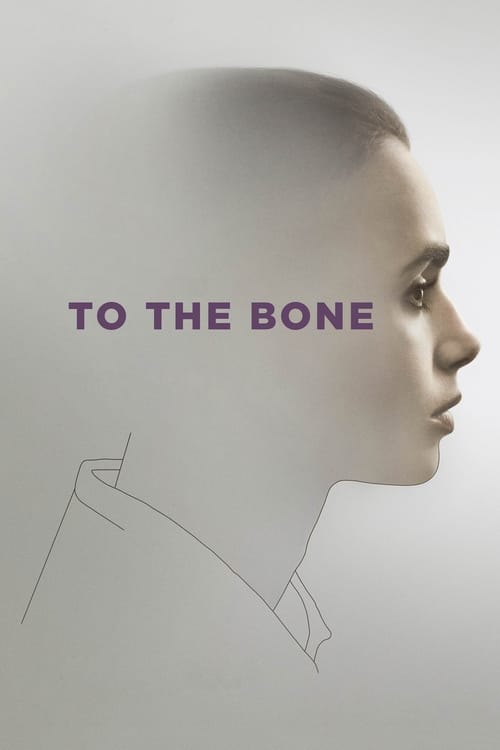
 To the Bone
— Don't fade away
To the Bone
— Don't fade away
To the Bone

A young woman dealing with anorexia meets an unconventional doctor who challenges her to face her condition and embrace life.

 To the Bone
— Don't fade away
To the Bone
— Don't fade away

A young woman dealing with anorexia meets an unconventional doctor who challenges her to face her condition and embrace life.
The rain room scene....breathtaking.
Keanu reeves gave some life lessons right there
_Rating: 9/10_
_Posted: 6 sept. 2019_
“I just don’t see the point”
- Ellen
An amazing performance by Lily Collins! A very powerful story with some gut wrenching turns.
:footprints:👼🦄
I've never had an ED but I think it was a great movie. I don't think it glamorizes anything, which I know a lot of people were worried about when the trailer came out.
I really liked the soundtrack and the acting was also really good. Lily Collins did as excellent job, as well as Keanu Reeves.
A movie which I think tells the truth without romanticizing an illness whatsoever. It's a serious subject and the movie will make you incredibly sad, but it will make you smile, heck, even laugh as well. The characters were all beautiful individuals with their own struggles and goals but at the same time the same thoughts. They understood each other when not many others did.
I loved the acting in this movie. Lily Collins is such a great actress and she gave this story so much meaning. It was an eye opener to see and hear her character tell about the things that go through her mind whenever she needs to eat. I think this movie helps you understand the illness better in some ways.
I really recommend you to watch this movie. It's a sad story, for sure, but in my opinion, it also helps people who don't know the illness (like me) understand. It's a quite hopeful story as well, which I think makes this movie an even more beautiful one.
I liked the film, and was glad it didn't try to give pat answers to eating disorders, or come across as preachy. Admittedly, my eyes did well up with tears quite a few times, and this thanks to the committed playing of the cast. Fortunately, there is hope, and some of that was found in the film.
Difficult movie to watch amazing perfomance from Collins 7.1/10
I can't say how accurate a portrayal of an ED this is, but I can say I didn't find it glamorizing EDs whatsoever. [spoiler]I saw it as a sad, hurting portrayal of very broken people, including the family members, and even the psychiatrist. I found the portrayal quite accurate for some mental issues, especially obsessive ones, where the person can know that they are hurting themselves but be unable to break from those thoughts for a very very long time. It left me with more questions than answers, and maybe that was the point.[/spoiler]
“To the Bone” tries to balance sensitivity and irreverence while tackling the extremely delicate topic of anorexia, but it stumbles precisely in the challenge of finding a consistent tone between psychological drama and an almost out-of-place lightness. Directed and written by Marti Noxon, who has personal experience with eating disorders, the film starts with an interesting goal: to avoid moralizing and instead get inside the head of someone living with the illness. But it ends up slipping into shallowness, with dramatic choices that undercut the emotional impact this topic demands.
The story centers on Ellen (Lily Collins), a 20-year-old woman bouncing between treatments, relapses, and a family that’s emotionally drained. From the first scene, Ellen is portrayed as someone who’s been through it all and now hides behind sarcasm. She looks at her own alarming physical state with a kind of chilling detachment—which makes sense as a defense mechanism in this world. The problem is, the film seems content to portray her illness as a series of loosely connected episodes rather than a deep, painful process of breakdown and rebuilding. And even though Collins fully commits to the role—both physically and emotionally—the script doesn’t go far enough in showing us who Ellen is beyond her anorexia.
Marti Noxon tries to avoid the typical “after-school special” vibe by adding dark humor and lingo used by people dealing with eating disorders, which at times results in harsh but authentic dialogue. There’s a particularly uncomfortable scene where two girls compare how “easy” it is to throw up certain foods—and while that may sound disturbing, it doesn’t glamorize anything. Instead, it reveals the warped logic these minds are operating under. The issue is, the film seems more interested in collecting moments like that than in building a solid character arc. Its fragmented structure and over-reliance on isolated scenes lead to a choppy emotional progression: things just sort of happen, without the audience feeling like there’s any real forward motion or purpose.
The introduction of a romance between Ellen and Luke (Alex Sharp) not only derails the story but is honestly kind of uncomfortable. He comes off as pushy, constantly crossing emotional boundaries Ellen clearly doesn’t want to cross, and the movie doesn’t seem aware of how invasive that dynamic actually is. What we’re left with is a forced, unnecessary romance that doesn’t spark any genuine emotional change—it just weakens the dramatic core of the film. Luke acts like a stereotypical “knight in shining armor” with motivational speeches at the ready, and instead of lifting the protagonist up, his presence kind of smothers her. It ends up hurting the authenticity of a film that, up to that point, seemed genuinely interested in respecting Ellen’s space and individuality.
Noxon’s direction gets the job done but lacks a real sense of command. Scenes like the group shower under a hanging art installation—which is clearly meant to be some kind of liberating moment—feel empty and out of place. There’s no real tension, no urgency. Even when the film tries more poetic or stylized visuals, it doesn’t manage to give them the symbolic weight they need. Keanu Reeves, as a doctor with unconventional methods, doesn’t add much emotionally. His character is barely fleshed out and feels more like a screenwriting device than a real therapeutic figure. Lines like asking Ellen to “tell her brain to fuck off” come across as overly simplified advice for something as complex and brutal as an eating disorder.
Another frustrating aspect is how “To the Bone” flirts with the idea that affection—whether it’s from a kind doctor, a worried sister, or a persistent guy—might be enough to heal a serious psychiatric illness. The film stops short of fully falling into that trap, thankfully, and it also avoids giving a neat, explanatory lecture about the root causes of anorexia (which would’ve felt reductive). Still, it never dives deep enough into the contradictions and nuances of the disease either. In the end, Ellen remains more of a symbol than a fully developed person. We learn about her body, her rituals, her resistance—but not about her history, her inner world, her psyche. It’s as if the film, much like the culture it tries to critique, is more interested in what she represents than in who she really is.
That said, it’s worth acknowledging that “To the Bone” dares to step into territory that most films avoid. There’s a sincere attempt to portray eating disorders without condescension, to give voice to people dealing with them, to show that pain comes in many forms. But its lack of focus, reliance on underdeveloped subplots, and shallow character work hold it back. This is a film with noble intentions and flashes of truth, but it can’t carry its own weight. Ironic, for a story about bodies and minds that can no longer carry themselves.
The rain room scene....breathtaking.